|
On 15th August 2019, H.E. Ambassador Liu Xiaoming held a press conference at the Chinese Embassy on the radical violence in Hong Kong which has escalated and caused severe damages. More than 50 journalists from 27 media agencies attended the press conference, including BBC, Radio 4, ITV, Sky News, Channel 4, Financial Times, The Daily Telegraph, The Times, Guardian, Reuters of the UK, China’s Xinhua News Agency, CCTV, China News Service, CGTN, China Daily, Economic Daily, Science and Technology Daily, Guangming Daily, and Global Times of China, and Bloomberg, CNN, Canadian Broadcasting Corporation, Phoenix Infonews, European Times, and UK Chinese Times. The following is the transcript of the press conference.
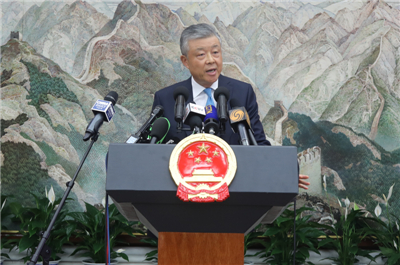
Ambassador: On 3 July, I held a press conference here to answer questions about the amendments to Hong Kong’s extradition laws and to explain China’s position. For more than a month since then, the opposition in Hong Kong and some radical forces have continued to use their opposition to the amendments as an excuse for various types of radical street protests. The violence involved has escalated and the damage to the society has expanded. The movement has gone way beyond free assembly and peaceful protests. It is posing a severe challenge to law and order in Hong Kong, threatening the safety of life and property of the Hong Kong people, undermining the prosperity and stability in Hong Kong and challenging the principled bottom line of “One Country, Two Systems”. As a result, Hong Kong now faces the gravest situation since its handover.
A handful of extreme radicals have been undermining rule of law, social order and “One Country, Two Systems” in Hong Kong. But they have taken cover under the so-called “pro-democracy movement” to hide their real intention and to whitewash their disruptive actions. This “neo-extremism” is both highly deceptive and destructive. The “neo-extremists” stormed the Legislative Council Complex, attacked the Liaison Office of the Central People’s Government in Hong Kong, assaulted police officers and brought Hong Kong airport to a standstill by illegal assembly. Their moves are severe and violent offences, and already show signs of terrorism. The Central Government of China would never allow a few violent offenders to drag Hong Kong down a dangerous abyss. We would never allow anyone to harm the rule of law and sound development in Hong Kong. We would never allow anyone to undermine “One Country, Two Systems” at any excuse. Should the situation in Hong Kong deteriorate further into unrest uncontrollable for the Government of the Hong Kong Special Administrative Region (SAR), the Central Government would not sit on its hands and watch. We have enough solutions and enough power within the limit of the Basic Law to quell any unrest swiftly.
This is a critical moment for Hong Kong. How will this end? This question is in the mind of all those who care about the future of Hong Kong. It is also hitting headlines and making “cover stories” in British media. Our answer to this question is firm and clear: We hope this will end in an orderly way. In the meantime, we are fully prepared for the worst. So how will this end in an orderly way? I think the following four points are extremely important.
First, the priority now is to support the SAR Government in ending violence and restoring order. I hope that Hong Kong people, especially the young people who have been led astray, would have a clear understanding of the current situation in Hong Kong and cherish the sound development of Hong Kong after the handover, which has not come by easily. I hope they will keep the big picture in mind, rally behind the Chief Executive and the SAR Government, uphold rule of law and justice in Hong Kong, and safeguard national unification as well as Hong Kong’s prosperity and stability. Hong Kong people from all walks of life must refuse to be used or coerced by the radical forces. They should say “no” to all violence and lawlessness. They should support the SAR Government in governing Hong Kong in accordance with law, and support the Hong Kong police in strict and rigorous enforcement.
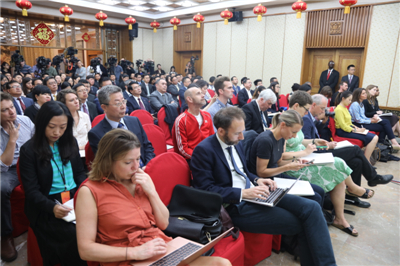
Second, the violent offenders must be brought to justice in accordance with law. It is the basic requirement of the rule of law that all laws must be observed and all offenders must be held accountable. The violent and lawless perpetrators must be brought to justice no matter who they are or however hard they try to whitewash their actions. If anyone in this country questions this point, let me ask them this: Would the UK allow extremists to storm the Palace of Westminster or damage its facilities, and get away with it? Would the UK give permission for attacking police officers with lethal weapons or set fire to the police station without any punishment? Would the UK allow so-called pro-democracy rioters to occupy the airport, obstruct traffic, disturb social order or threaten the safety of people’s life and property? Aren’t all these regarded as crimes in the UK?
Indulging lawlessness is tantamount to blaspheming against justice. Conniving in violence is tantamount to trampling on the rule of law. No country under the rule of law, no responsible government, would sit by and watch as such violence rages on. The Central Government of China firmly supports the SAR Government and Hong Kong police in strict, rigorous and decisive enforcement, so as to bring the offenders to justice as soon as possible and uphold the rule of law and social order in Hong Kong.
Third, foreign forces must stop interfering in Hong Kong’s affairs. Evidence shows that the situation in Hong Kong would not have deteriorated so much had it not been for the interference and incitement of foreign forces. Some Western politicians and organizations have publicly or covertly given various types of support to the violent radicals, and tried to interfere in the judicial independence of Hong Kong and obstruct Hong Kong police from bringing the violent offenders to justice.
I want to reiterate here that Hong Kong is part of China; no foreign country should interfere in Hong Kong affairs. We urge those foreign forces to respect China’s sovereignty and security, immediately stop interfering in Hong Kong affairs, stop interfering in China’s internal affairs, and stop conniving in violent offences. They should not misjudge the situation and go down the wrong path. Otherwise, they will “lift the stone only to drop it on their own feet”.
Fourth, the media must shoulder due social responsibilities. Since what happened in Hong Kong, I have to say, the Western media have failed to play a credible role. Instead of reporting the situation in a just and objective manner, they have confused right and wrong, given unbalanced account and misled the public. There has been massive coverage on so-called “right to peaceful protest” but few reports on the violent offences by the extreme radicals such as disruption of social order, attacks on police officers and injuries to bystanders. There has not been a word about the extensive public support for the SAR Government and for restoring law and order in Hong Kong. The lawless and violent offenders who undermine rule of law are whitewashed and named “pro-democracy activists” in media reports. But the legitimate law enforcement measures of the SAR Government and the police to uphold law and order and protect life and property of the people are labeled “repression”.
Such selective reporting and distortion have resulted in the prevalence of wrong information and have misled the public, especially young people in Hong Kong. It is fair to say that Western media have inescapable responsibility for the current situation in Hong Kong!
I sincerely hope that Western media would reflect on the social impact of their reporting, shoulder due social responsibilities, and report the situation in Hong Kong in a just and objective manner. I hope they would stop speaking up for the extreme violent offenders, refrain from pouring oil over the flame in Hong Kong, and foster a sound environment of public opinion so that law and order could be restored in Hong Kong.
To help you understand the fourth point that I have just made, I would like to show a short video clip, so that you could see some scenes and hear some voices that are absent in Western media.
(Video clip is played.)
“Order fosters prosperity while unrest brews regress.” Given what is happening in Hong Kong, this ancient Chinese teaching cannot be more relevant.
It is in the interests of both China and the international community including the UK to have a prosperous and stable Hong Kong, where over three hundred thousand British citizens live and work, and where three hundred British companies are doing business.
I sincerely hope that people from all walks of life in the UK will have a clear understanding of the big picture, act in the interest of Hong Kong’s prosperity and stability, and refrain from saying or doing anything that interferes in Hong Kong’s affairs or undermines rule of law in Hong Kong. I am confident that with the support of the Central Government of China and under the leadership of the SAR Government and Chief Executive Carrie Lam, Hong Kong will bring violence to an end and restore law and order at an early date. Hong Kong, the “oriental pearl”, will once again shine brightly.
Now I would like to take your questions.
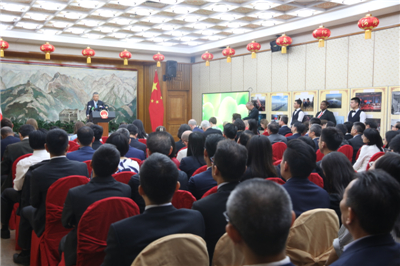
Bloomberg: I noticed that there was one moment in the clip when one of the speakers pointed out that Hong Kong police were not using live ammunition. There have been armed personnel carriers and troops, shown on social media and TV, just outside Hong Kong. If they were to be deployed at some point as you suggest is possible, would they use live ammunition? Would they be entitled to use it?
Ambassador: I would answer your question in this way. I think the Hong Kong situation is at a very critical moment. But we have full trust and confidence in the Chief Executive and the Government of Hong Kong Special Administration Region in handling the situation and bringing it to an end in an orderly way. As I said in my opening remarks, if the situation deteriorates further into unrest uncontrollable for the SAR Government, the Central Government will not sit by and watch. We have enough solutions and enough power to put it to an end and to quell the unrest swiftly.
CNN: We have a message from President Trump saying that he is willing to discuss with President Xi Jinping on this situation. Has there been any response yet to this suggestion? If it is being considered, will it help to resolve the situation?
Ambassador: I don’t think President Trump proposed formally to have a meeting with President Xi Jinping. I thought he tweeted to express his views on Hong Kong. Hong Kong is a constant subject between China and Western governments, including the UK and the United States. We are open to discussion. But the important thing to remember is that we do not accept any interference in Hong Kong’s internal affairs. We believe it is purely China’s internal affairs. We strongly oppose any foreign intervention, including foreign organizations giving financial support and some Congressmen proposing so-called Hong Kong Human Rights and Democracy Act. Especially, we are opposed to foreign officials making telephone calls to the SAR Government and exerting pressures by publicly showing their support for the rioters. We strongly oppose this.
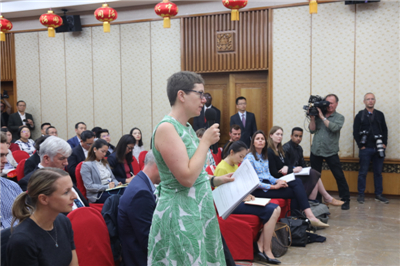
Reuters: I noticed that you said in your opening remarks that the behaviors of some of the protesters are showing some signs of terrorism. I wonder whether you’d mind explaining to us what would be the red line or turning point over which they would constitute terrorism? Would that then provide, under Chinese Law, a legal justification for the deployment of Chinese forces in Hong Kong?
Ambassador: From both the video clip and also what is happening in Hong Kong, especially what is happening at the airport, the atrocities have already drawn worldwide condemnation. Many media regarded them as terrorist acts. They are no different from terrorism. They are attacking the police, attacking the travelers, even attacking journalists, one of your colleagues from China. We heard strong condemnation from the Chinese Association of Journalists on this kind of attacks. So we call it a sign of terrorism and near-terrorism. I would call it neo-extremism. If it goes further, it might become the neo-terrorism or terrorist action.
Even if it becomes a terrorist action, I still hope that Hong Kong SAR Government and Hong Kong police can handle the situation. What I am saying is that if the situation deteriorates into unrest uncontrollable for Hong Kong SAR Government, the Central Government will certainly not sit by and watch.
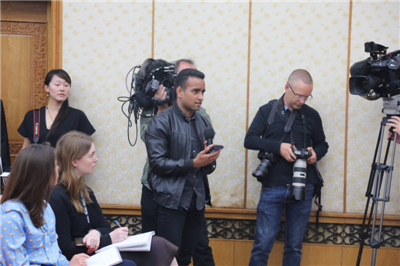
Russia Today: According to reports, the National Endowment for Democracy in the US has been funding some of Hong Kong protesters. Has Beijing concluded that the Hong Kong protests are entirely a US plot to destabilize China?
Ambassador: I think you’ve already partly answered the question. We believe there is a “dark hand” behind the radical movement. As I mentioned in my opening statement, some foreign forces including foreign organizations provided financial support and moral support to the radical movement. Especially, some foreign officials met the leaders of Hong Kong independence group. This clearly showed their intention is to make Hong Kong a problem for China, to use Hong Kong to contain China, to prevent China from developing smoothly and to prevent China from becoming a prosperous country. That’s for sure! That’s why I am saying, in order to end the chaotic situation in Hong Kong in an orderly way, it is very important for the foreign forces to stop interfering further in Hong Kong’s affairs, including the activities you have mentioned.
The Times: I wonder if you could respond to the suggestion of the Chairman of the Foreign Affairs Committee that full British citizenship be extended to all Hong Kong citizens. Would China regard that as a provocation?
Ambassador: I think some politicians in this country, although their bodies live in the 21st century, their heads are still in the colonial days. I think some of them still regard Hong Kong as a part of the British Empire. They treat Hong Kong as a part of UK. That's the problem. I think they really have to change their mindsets, put them in the proper position, and regard Hong Kong as a part of China, not a part of UK.
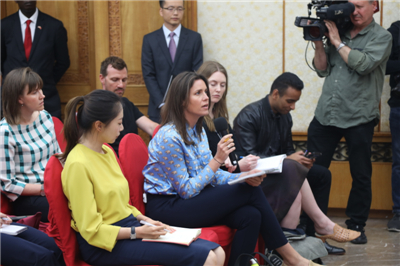
ITV: You said earlier that Beijing is fully prepared for the worst. Can you clarify exactly what that means? And also people see some satellite images of troops and tanks assembled in Shenzhen. Is this a means of intimidation or is Chinese military action a very real possibility, or even imminence?
Ambassador: In my opening statement, I have already answered this question. The first part is about the kind of situation where resolute solutions should be needed. I said, if the situation deteriorates further into unrest controllable for the Hong Kong SAR Government, then the Central Government will not sit by and watch. And we have enough solutions and enough power to quell the unrest swiftly. If you listen to my remarks word by word, you would get the answer to your question.
ITV: What exactly does “quell” mean though? How would you quell the protests?
Ambassador: To put this to an end. Thank you.
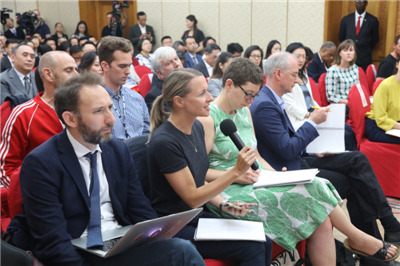
Sky News: You talked about how Beijing has the power to deal with this problem. Could you give us a sense of the scale of forces you have available to deploy into Hong Kong if necessary? Are they properly trained to deal with what is a civilian uprising, civilian unrest, as opposed to the military problem? And then secondly if I may, this is your second press conference. Last time, we had a different prime minister. Now we've got Prime Minister Boris Johnson. Last time, you said the relations between Beijing and London had been damaged by, for example, our then Foreign Secretary's comments on Hong Kong. What are the relations like now? Are the relations better or maybe healed between the UK and China? Or are they still being damaged? What is your message for the Prime Minister?
Ambassador: To answer your first question, I think I have already answered your question. First, this is a hypothetical question. Currently, we still believe that Hong Kong SAR Government is capable of doing their business. The Chief Executive is a very capable leader in Hong Kong, enjoying broad respect and support. So, at this moment, I think they are still handling it very well. We have full trust. So we haven't got to the point to discuss about what scale of power and solutions we are going to use. I have answered this question. We are confident and we have enough solutions and enough power to put this to an end swiftly.
With regard to your second question, we certainly would like to see relations develop further, because we believe it's in the interests of China and the UK to have a sound relationship. Of course I didn’t expect you have a new prime minister so soon. So I need to be careful with my press conference. I do not hope that at the next press conference we will talk about another prime minister, but you do not take this seriously.
This is the fourth prime minister I'm going to work with. We have expectations. We do hope relationship will move along the direction of Golden Era set by President Xi during his state visit. But good relationship has to be based on the basic principles of mutual respect for sovereignty and territory integrity, and non-interference in the internal affairs of each other. It was enshrined in the Joint Communiqué on establishing diplomatic relations between our two countries. As long as these principles are followed, the relationship will move forward. When these principles are violated, the relationship will suffer setbacks. So we do hope the new administration will handle with great caution the Hong Kong issue, which is about China's sovereignty, which is about China's territorial integrity, which is about China's internal affairs. Thank you.
Guardian: What is your definition of “uncontrollable”? What would you be looking for to define when the situation has become uncontrollable?
Ambassador: Do you think we have to consult the Oxford English Dictionary for what “uncontrollable” is? Uncontrollable is out of control. We do hope that the situation will still be under control of the SAR Government and the Chief Executive. I believe the current situation is still under control.
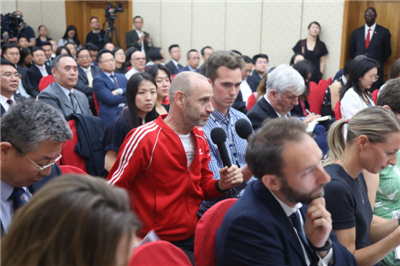
BBC Radio 4: Ambassador, you painted the protesters as violent and as extremists. Can I ask you whether you would acknowledge that for every violent or extremist protester, there are many ordinary citizens in Hong Kong, lawyers and civil servants, who are deeply disappointed by what is happening on the Chinese government side, and to support the idea that people having more say in their own administration, and to support the fifth demand of protesters, the universal suffrage? Would you acknowledge that there are many people who are not violent or extremist protesters? Can you remind us and the people of Hong Kong why China finds it so objectionable to give them universal suffrage? If I may ask a second question, does China still regard the Joint Declaration signed with Britain in 1984 as applying and constraining its behavior in Hong Kong?
Ambassador: Evan, I haven’t seen you for quite a while since I last went on your program. Your first question is about the demonstrators. We certainly have acknowledged the difference between the young people and the radical violent offenders. A few radicals do not represent the majority of the demonstrators. The majority of them have been misled. I think Hong Kong media has responsibility and Western media has responsibility.
There are some complaints. In any society you have all kinds of complaints. Since Hong Kong’s handover, enormous achievements and progress have been made under “One Country, Two Systems”. But there is still a lot of room for improvement, like how young people would advance their career. There are many problems in Hong Kong economy. Hong Kong economy has depended too much on financial services and real estate, which offers little opportunities to young people. So they have complaints. We understand. The Central Government and SAR Government have tried very hard to address these problems. We have launched the Guangdong-Hong Kong-Macao Greater Bay Area development project. I don’t know how many of you know this, but I do not have time to elaborate in details. That will give Hong Kong young people more opportunities.
If you compare Hong Kong with Shenzhen across the river, it’s quite a contrast. In 30 years time, Shenzhen has been transformed into a dynamic city full of vigor, many young people, a lot of high-tech and new technology companies like Huawei, Tencent, Dajiang, many top world-class companies. What world-class high-tech companies can you find in Hong Kong? To address these problems, we have to focus on development. Demonstrations offer no solution. Chaotic situations would only make young people suffer more. We will certainly address the concerns of the young people. We certainly understand the difference between the young people who have been misled, who have been led astray as I said, and those radical violent offenders.
Your second question is about the Joint Declaration. I think people often confuse “One Country, Two Systems” with the Joint Declaration. Joint Declaration has completed its mission. Its main mission was to ensure a smooth handover of Hong Kong from UK to China. And it was also its mission to ensure a 13-year smooth transition period between 1984, when China and UK agreed on the handover and 1997. And that was its main mission. Yes, the Joint Declaration mentioned “One Country, Two Systems”. But that is a national policy unilaterally announced by the Chinese Government. It is incorporated in the Basic Law of Hong Kong. So when we say China is committed to the Basic Law and “One Country, Two Systems” for 50 years, we are not saying we are committed to the Joint Declaration for 50 years.
About universal suffrage, the Central Government is committed to universal suffrage. We believe this is the final aim of political reform in Hong Kong. But it has to proceed in an orderly way and it has to suit the conditions of Hong Kong. If it had not been for the opposition in Hong Kong in 2015, the Legislative Council would have passed a law on universal suffrage. They were not happy with this law, so they blocked it. They killed this law and postponed the process. There are so many things that are not known by the Western public. The government is fully committed to universal suffrage. But it has to be carried out in an orderly and gradual way in accordance with law.
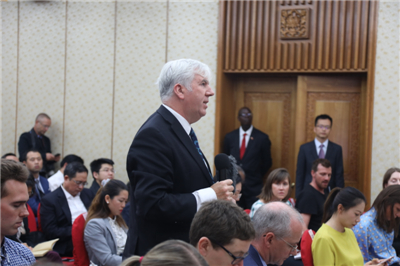
BBC Diplomatic Correspondent: You talked about there being no place for foreign interference in China’s internal affairs. Does that mean the present British government is interfering in the internal affairs when it calls for dialogue to end the crisis in Hong Kong?Is one of the solutions that you would examine carefully to find a way through this to move beyond mere suspension of the extradition law? Would you be prepared to move to full withdrawal, one of the basic points raised by the protesters? My second question is about the potential use of force. You said China will use whatever means necessary to quell the protests
Ambassador: Not the protest. To quell the unrest.
BBC Diplomatic correspondent: If you were to use the Chinese army in Hong Kong, do you accept that it would have the effect of destroying the “two systems” and Hong Kong’s autonomy, and do great damage to China because it will suffer economically and in trade as a result?
Ambassador: I think you asked three questions and I am trying to remember them all. Maybe the last question first. As I said, we have enough solutions and enough power to put this to an end swiftly. By doing this, we are exactly defending “One Country, Two Systems”. Some of the radical forces call for independence of Hong Kong. They want to use Hong Kong to infiltrate into the mainland, to interrupt the socialist system in the mainland. So in both ways, they undermine “One Country, Two Systems”. When we talk about “One Country, Two Systems”, people have to be aware that it’s a complete whole. “One country” means that Hong Kong is part of China and China has sovereignty over Hong Kong. “One country” is the precondition for “two systems”. Without “one country”, there will be no “two systems”. So, the two are one complete whole. We can’t emphasize one at the expense of the other. I think what China is going to do -- to put the situation under control -- is exactly for “One Country, Two Systems”.
About the telephone conversation, as I said, we are open to discussions on Hong Kong. But the important thing is that you can’t use telephone conversation to exert pressure on the SAR Government. For instance, you are saying that you are concerned about the police’s excessive use of force and you condemn the violence on both sides. That is not fair. You can’t give a 50-50. You confuse right and wrong. If you accuse the right things, you certainly support the wrong things. The important thing is the nature of the conversation, whether it is an intervention or not. British politicians are visiting Hong Kong all the time. We show no objection to them. But if you make a comment to interfere in the judicial independence of Hong Kong, you are trying to obstruct it. Just like some politicians said before that one cannot punish those radicals and violent offenders. It just obstructs the legal system in Hong Kong. That can not be accepted at all.
We expressed our concerns about some of the comments by British politicians. I really hope that they change their mindset and have a big picture in mind about the prosperity and stability in Hong Kong and broad interests of the UK. A prosperous and stable Hong Kong is really in the interest of the UK, not only in the interest of Hong Kong and China.
About the withdrawal of the bill. You know the bill has been suspended by the SAR Government. Whether it will be withdrawn is up to the Hong Kong SAR Government to decide. The Chief Executive promised to have further communication and discussions with the public and various sectors in Hong Kong. From the very beginning in my first press conference, I said this is a good bill. It serves the interest of Hong Kong. It will make Hong Kong a safe haven of justice rather than a safe haven of fugitives. I think the intension is to improve the legal system of Hong Kong but it was not well understood. So it might take time for the SAR Government to explain their position, to convince the public that it is in Hong Kong’s interest to pass this bill.
BBC News Night: In the video, you showed a journalist at the airport surrounded by protesters. You didn’t show the other guy surrounded by protesters who turned out to be a law enforcement official from Shenzhen not wearing uniform. How many other such mainland law enforcement officials are currently operating in Hong Kong?
Ambassador: Your information is not what I know. Yesterday, an ordinary traveler was round up by the rioters at the airport. He was from Shenzhen and he came to the airport to see off a friend. The other one was a journalist from China, who was tied up. Some people regarded him as a police, but he turned out to be a journalist who has a name, a registered journalist.
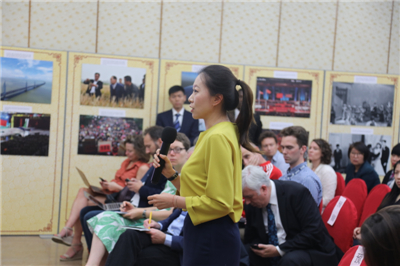
CGTN: My first question is that, as the violence escalates, the Hong Kong police response would escalate inevitably. We all know what Hong Kong police have experienced these days? In other countries, it equals to aggravated assault which will be dealt with seriously. But why they are still the target of blames in some of the media, in most of the Western media, even when they are so restrained? My second question is that yesterday, some British companies were warned to evaluate the risks to investment in Hong Kong. More than 28 countries have been noted to issue different levels of warnings to travelers to Hong Kong. Analysts say that currently this is a kind of the turning point for Hong Kong’s economy. So what is your view?
Ambassador: I think you are absolutely right in talking about the behavior of Hong Kong police. I think they exercise their duty with great restraint, more so than in many other countries. They are very professional and have won praise from many countries, including the US, Canada, France. You know, if things like this happen in the Western countries, the police would deal with them with much more force.
That reminds me of something just a few months ago, in June. When the Extinction Rebellion applied to put up a demonstration in Heathrow Airport, they were warned by the British police that those involved would face a life sentence and urged to reconsider. We’ve all watched how the British police handled the riot in London. And I don’t need to remind you of what kind of force they used.
On the Hong Kong economy. Yes, it suffered. What is happening in Hong Kong really damaged the international image and reputation of Hong Kong. It’s very sad. Hong Kong is a very safe place. Its rule of law rating is very high. In terms of Project of Justice index, it’s even three steps higher than the United States last year. It ranked 16th while the United States ranked 19th. I’m talking about law and order, not safety. On safety, Hong Kong will be much safer than the other Western cities.
Of course, we all read that Hang Seng stock falls 9% and Hong Kong dollar falls. Many things fall. It’s very sad. I think people, as I said in my opening remarks, should treasure the hard-won development of Hong Kong. I do hope common sense will prevail in Hong Kong. I just heard many statements yesterday by the business leaders. They’ve kept quiet for some time, but now they spoke out. They realized what kind of damage this chaos in Hong Kong will do to the city, to the prosperity and stability of Hong Kong.
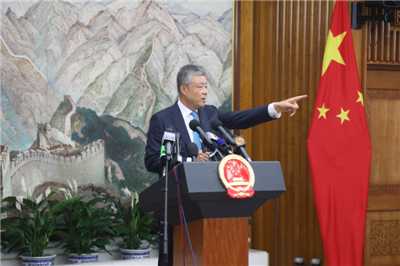
Reuters: Thank you for taking a second question. Earlier when my colleague from the BBC asked about the extradition bill, you said it’s up to the Hong Kong SAR Government to decide whether it will be withdrawn or not. And you immediately added that you think it a good bill and it wasn’t fully explained and should be explained further. Just to be completely clear, if Carrie Lam and the Hong Kong SAR Government decided to withdraw the bill fully, would the Central Government of China allow them to do so?
Ambassador: At the very beginning, many people thought that this move is under the order or instruction from the Central Government. That was not true. This initiative is completely the decision of the Hong Kong administration. Chief Executive Carrie Lam spoke on many occasions that she received no order or instruction from the Central Government to launch this process. She decided to suspend it and we showed understanding, respect and support. So I hope you will keep in mind the three words I gave you: understanding, respect and support. And I think that we will continue to do this along the road.
Russia Today: As you know the trade war with the US is continuing and Donald Trump has sought to use Huawei to put pressure on China. Do you think there is a chance that the US would do the same to Hong Kong, in terms of getting a fair world trade deal? How would Beijing respond?
Ambassador: The talks are still going on, and I personally feel cautiously optimistic about the future of the China-US trade relations. Member of the Political Bureau of the CPC Central Committee and Director of the Office of the Foreign Affairs Commission of the CPC Central Committee Yang Jiechi is in New York and had a talk with Secretary Pompeo. They had a very candid discussion on the bilateral relations, including trade issues.
On Hong Kong, China will never compromise its principles for a trade deal. We wouldn’t barter away our principles. It’s purely China’s internal affairs which brook no foreign intervention, no matter which country it is from.
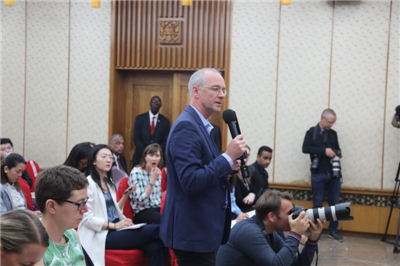
Bloomberg: The entire Hong Kong business community would agree with you when you said that the unrest has been very bad for the economy, bad for Hong Kong’s position as a global financial centre. And yet many would also argue that if the Chinese Central Government were to intervene directly, that could be even worse. In order to solve this, it will require some sort of engagement with the protesters whom you acknowledged are not all violent and many have some legitimate concerns. Do you not think that the position you laid out here, which is quite hard-line, should allow more space for engagement with the protesters, in the interest of, as you said, maintaining stability, economic well being and international image of Hong Kong?
Ambassador: Let me ask you this. We are talking about an unpleasant situation. If Hong Kong’s situation becomes uncontrollable and unrest goes on and on, will it serve the interests of the business community in Hong Kong? Or the Central Government will intervene with a resolute solution and put an end to unrest as quickly as possible, will that serve their interests? I think the answer would be the latter.
But that’s an extreme situation. That is a situation we would not like to see. And we hope to see the situation end in an orderly way, which includes that the people should rally behind the Hong Kong SAR Government and rally behind the Chief Executive to support Hong Kong SAR Government to put this to an end, to bring the violence and law offenders to justice, and to restore order. That is the top priority of Hong Kong today.
BBC: You draw a distinction between the violent protesters and nonviolent protesters. I just want to be clear. Can you unequivocally tell the people of Hong Kong that if the violence stops but peaceful protest continues, there is no way that the central Chinese authorities will intervene in the internal affairs of Hong Kong? It is only the violence that China will quell or stop.
Ambassador: I hope you should go back to my opening statement. I said if the situation in Hong Kong deteriorates into unrest uncontrollable for the Hong Kong SAR Government, the Central Government would not sit by and watch. And we have enough solutions and power to quell the unrest swiftly. What you are talking about is a situation that is not happening. It is still under control of the Hong Kong SAR Government. So we do not need to talk about that part.
BBC Radio 4: It may go beyond control?
Ambassador: That shows your lack of understanding of the situation. You have underestimated the capability of Hong Kong SAR Government and the Hong Kong police. They are fully prepared and equipped to handle peaceful demonstration -- but it has to be peaceful.
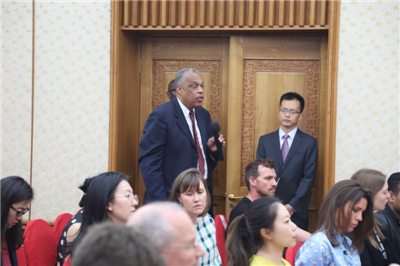
CNN: You talked about how patient you’ve been right now, and you were suggesting that you have resources and solutions to quell it swiftly. What sort of timeline we are looking at? Let’s suppose by this time next week, do you think the Hong Kong SAR Government will be able to resolve the crisis by itself without the support of the Central Government? Or we will still be having this conversation next week?
Ambassador: As I said, we have full trust in the Hong Kong SAR Government. I hope they will put an end to it at an early date, as soon as possible. Maybe we do not need another press conference. We’ll see.
Thank you.
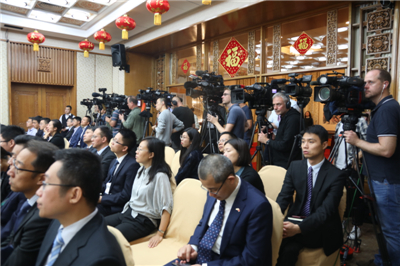
|

